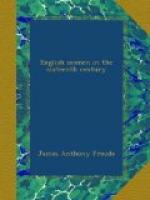LECTURE VII
ATTACK ON CADIZ
I recollect being told when a boy, on sending in a bad translation of Horace, that I ought to remember that Horace was a man of intelligence and did not write nonsense. The same caution should be borne in mind by students of history. They see certain things done by kings and statesmen which they believe they can interpret by assuming such persons to have been knaves or idiots. Once an explanation given from the baser side of human nature, they assume that it is necessarily the right one, and they make their Horace into a fool without a misgiving that the folly may lie elsewhere. Remarkable men and women have usually had some rational motive for their conduct, which may be discovered, if we look for it with our eyes open.
Nobody has suffered more from bad translators than Elizabeth. The circumstances of Queen Elizabeth’s birth, the traditions of her father, the interests of England, and the sentiments of the party who had sustained her claim to the succession, obliged her on coming to the throne to renew the separation from the Papacy. The Church of England was re-established on an Anglo-Catholic basis, which the rival factions might interpret each in their own way. To allow more than one form of public worship would have led in the heated temper of men’s minds to quarrels and civil wars. But conscience might be left free under outward conformity, and those whom the Liturgy did not suit might use their own ritual in their private houses. Elizabeth and her wise advisers believed that if her subjects could be kept from fighting and killing one another, and were not exasperated by outward displays of difference, they would learn that righteousness of life was more important than orthodoxy, and to estimate at their real value the rival dogmas of theology. Had time permitted the experiment to have a fair trial, it would perhaps have succeeded, but, unhappily for the Queen and for England, the fire of controversy was still too hot under the ashes. Protestants and Catholics had been taught to look on one another as enemies of God, and were still reluctant to take each other’s hands at the bidding of an Act of Parliament. The more moderate of the Catholic laity saw no difference so great between the English service and the Mass as to force them to desert the




